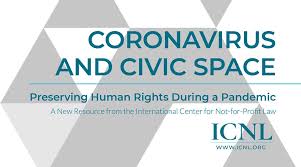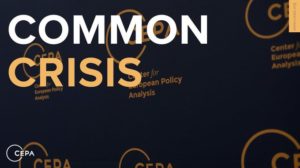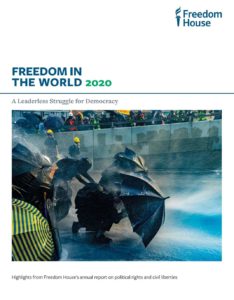 Hungary’s parliament endorsed a bill on Monday giving nationalist premier Viktor Orban the sweeping new powers he says he needs to fight the new coronavirus pandemic. Critics at home and abroad have condemned the “anti-coronavirus defence law”, saying it gives Orban unnecessary and unlimited power and is a means of cementing his position rather than battling the virus, RFI reports:
Hungary’s parliament endorsed a bill on Monday giving nationalist premier Viktor Orban the sweeping new powers he says he needs to fight the new coronavirus pandemic. Critics at home and abroad have condemned the “anti-coronavirus defence law”, saying it gives Orban unnecessary and unlimited power and is a means of cementing his position rather than battling the virus, RFI reports:
After declaring a state of emergency on 11 March, the new law gives Orban the power to indefinitely rule by decree until the government decides the emergency is over. It removes the current requirement for MPs to approve any extensions to decrees. Elections cannot be held either during the emergency period.
In introducing such measures, Orbán has become the first EU leader to exploit the pandemic for his own political ends, notes Carnegie’s Judy Dempsey. And he will not be the last—unless other European and NATO leaders sanction him.

National Endowment for Democracy
At home, the political landscape is highly polarized. One segment believes everything that Fidesz says, the other disbelieves it, CEPA’s Edward Lucas adds:
Many critics of the government believe that rule by decree will be the opportunity to intimidate the opposition and independent media, abolish elections, and ultimately to replace democracy with dictatorship. A more nuanced interpretation is that the crisis will be a springboard for Fidesz’s electoral success, with elections to be called after the seemingly successful management of the pandemic and before the resulting economic crisis bites.
Russian media has suggested (falsely) that a British facility created the coronavirus and deliberately planted it in China, note analysts Iain King and Rachel Ellehuus. Seeking to undermine support for NATO, Russia’s Twitter army suggested that DEFENDER 2020, a planned NATO exercise that has since been scaled back significantly, will spread the virus throughout the population of several member states, they write for CSIS:
Since January, the European External Action Service has logged more than 110 cases of Russian disinformation. The stories, released in multiple languages, aim to exacerbate the crisis by sowing distrust in Western countries’ health care systems, leaders, and scientific experts. Learning from previous episodes, such as the downing of Malaysia Airlines Flight 17 and the Salisbury poisonings, Moscow has honed the tactic of pushing out multiple contradictory lines at once to sow maximum confusion.

CEPA
As governments pull out more and more stops to fight the new coronavirus, they are turning to sophisticated technologies to bolster their monitoring and surveillance efforts, notes Steven Feldstein, a nonresident fellow in Carnegie’s Democracy, Conflict, and Governance Program.
Even in strong democracies, the temptation to leave in place intrusive directives and to redefine norms of privacy will be tempting. Citizens should demand transparent rules for how governments plan to use their data, timebound limitations for such authorizations (perhaps requiring governments to seek renewals every ninety days), and accountability checks to guarantee governments are not abusing these measures, he writes:
In authoritarian countries like China and Russia, which already have abhorrent records of exploiting digital technologies for repressive political control, the struggle may have reached a tipping point. Without strong pushback from concerned publics, it is hard to imagine Chinese President Xi Jinping or Russian President Vladimir Putin backing away from new mass surveillance capabilities even once the public health threat subsides.
The #coronavirus outbreak presents a range of new challenges to democracy and human rights, Freedom House contends.
 The steady erosion of democracy around the world in recent years may be reaching an alarming inflection point, according to Michael Abramowitz and Arch Puddington, Freedom House president and senior democracy scholar, respectively. In the first decades after the Cold War, authoritarian states and illiberal regimes were largely content to wield and abuse power without extensive violence or bloodshed, they write for the Bulwark. But today, they are casting off their reticence and openly crushing any civilian populations or scapegoated groups that stand in their way.
The steady erosion of democracy around the world in recent years may be reaching an alarming inflection point, according to Michael Abramowitz and Arch Puddington, Freedom House president and senior democracy scholar, respectively. In the first decades after the Cold War, authoritarian states and illiberal regimes were largely content to wield and abuse power without extensive violence or bloodshed, they write for the Bulwark. But today, they are casting off their reticence and openly crushing any civilian populations or scapegoated groups that stand in their way.
In the desperate fight against the coronavirus, social media platforms have achieved an important victory: they have helped limit the dissemination of life-threatening misinformation that could worsen the pandemic. But this success should not cause us to adopt a similar approach to political speech, where greater caution is required, note analysts Sarah Kreps and Brendan Nyhan:
Facebook, Twitter, and YouTube have each moved quickly to remove coronavirus misinformation that encourages people to take actions that could put them at risk. Google has established a 24-hour incident-response team that removes misinformation from search results and YouTube. Facebook’s WhatsApp has teamed up with the WHO to provide a messaging service that offers real-time updates, they write for Foreign Affairs:
 Misinformation, rumors, myths, and conspiracy theories still slip through the net, of course, and new threats may yet emerge—for instance, Russia is taking a page from its 2016 playbook and trying to use disinformation about the coronavirus to foment political unrest in Europe and the United States. But so far, social media and Internet groups have earned praise for making a concerted, and thus far successful, effort to limit misinformation. To date, no specific false claim or conspiracy theory has become widespread in the manner often observed during disasters and tragedies.
Misinformation, rumors, myths, and conspiracy theories still slip through the net, of course, and new threats may yet emerge—for instance, Russia is taking a page from its 2016 playbook and trying to use disinformation about the coronavirus to foment political unrest in Europe and the United States. But so far, social media and Internet groups have earned praise for making a concerted, and thus far successful, effort to limit misinformation. To date, no specific false claim or conspiracy theory has become widespread in the manner often observed during disasters and tragedies.
The domain of medical information differs enormously from that of politics, where free speech must be protected and where exposure to false information does not threaten people’s health, they add. The best a liberal democracy can do is limit the influence of misinformation, not try to eradicate it like a virus. RTWT







